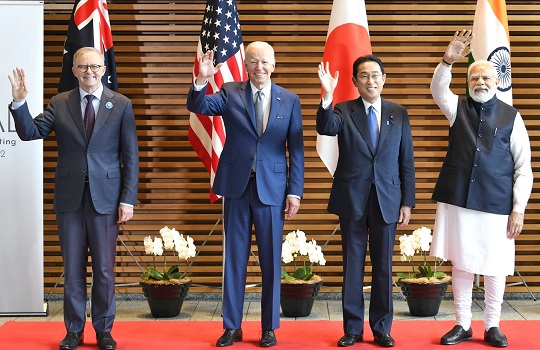
Leaders from across the four Quad countries, Australia, Japan, US and India, have committed to improving information-sharing among their Computer Emergency Response Teams (CERT), including “exchanges on lessons learnt and best practices”, according to a communique issued by the White House.
Under the Quad’s Cybersecurity Partnership agreement, the four governments have also agreed to improve and align cybersecurity standards for software procurement across the Quad countries, hoping to “improve software and managed service provider (MSP) security”.
The cybersecurity agenda of the Quad Leaders’ Summit 2022, held in Tokyo and attended by newly elected Australian Prime Minister Anthony Albanese, US President Joe Biden, Prime Minister Narendra Modi of India, Prime Minister of Japan Fumio Kishida, further included proposals to launch a new ‘Cybersecurity Day’ campaign.
The campaign will be open to countries across the Indo-Pacific and beyond, as part of its efforts to strengthen cybersecurity awareness and action. The initiative will provide basic cybersecurity information and training to vulnerable sectors of the community, including schoolchildren, small businesses, and the elderly.
The campaign will be led by the Quad partners, alongside industry, non-profits, academia, and communities to maximise its effectiveness and reach.
The Quad Cybersecurity Partnership has a number of key focus areas, including critical infrastructure protection, specifically led by Australia, supply-chain resilience and security, led by India, workforce development and talent, led by Japan, and software security standards, led by the United States.
Quad partners have also announced they will “explore ways” to collaborate on the deployment of open and secure telecommunications technologies in the region, working with industry through the Open RAN Track 1.5 dialogues.
This included a new Memorandum of Cooperation on 5G Supplier Diversification and Open RAN, which will see the Quad cooperate on technical exchanges and testbed activity to advance interoperability and telecommunications cybersecurity.
In a likely bid to counter China’s growing influence on tech and telecoms standards, the Quad will also launch a new International Standards Cooperation Network – a mechanism for like-minded allies and partners to share information on technical-standards activities and increase situational awareness, coordination, and influence in international critical and emerging technologies standards.
A key aim of the network is to give Quad members greater “influence in international critical and emerging technologies standards.”
The Quad will also work more closely with the private sector on opportunities in critical and emerging technologies, launching the Quad Investors Network, an independent consortium of investors intended to advance access to capital for critical and emerging technologies within and across the Quad.
The Quad partners first committed to responsible innovation in critical and emerging technologies by launching the Critical and Emerging Technologies Working Group at the first-ever leader-level summit of the Quad in March 2021.
During the current summit, the Quad mapped collective capacity and vulnerabilities in global semiconductor supply chains, releasing its Common Statement of Principles on Critical Technology Supply Chains, which is aimed at a cooperative foundation for enhancing supply-chain resilience in the region.
The Quadrilateral Security Dialogue (QSD) or ‘Quad’ summit, also dubbed the ‘Asian NATO’, is a diplomatic and military arrangement between the Asia-Pacific powers, providing an opportunity for the four counties to engage in strategic security dialogue.





